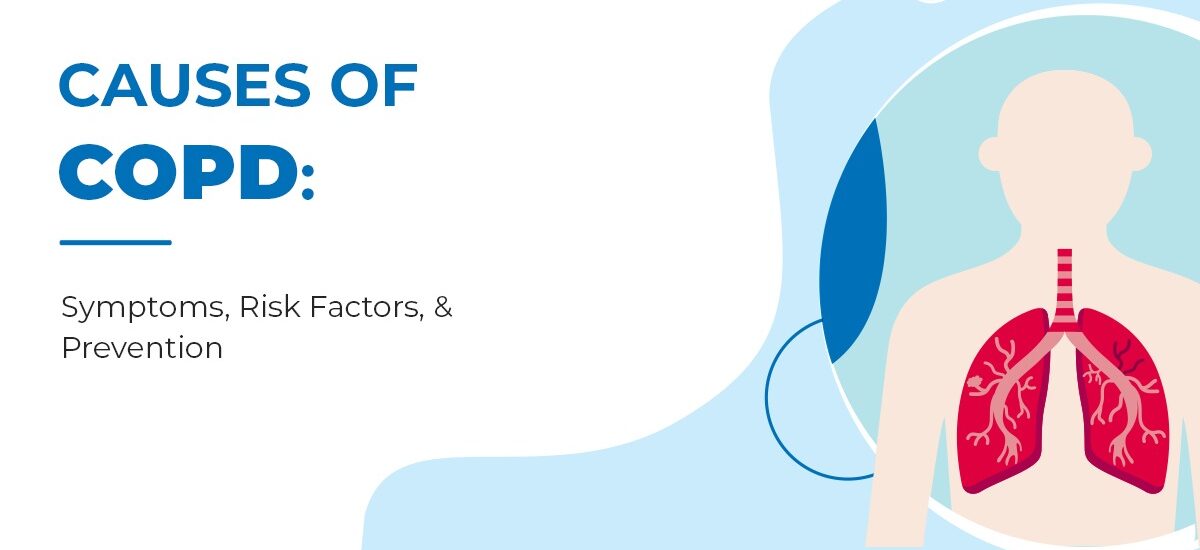Chronic obstructive pulmonary disease (COPD) is a chronic inflammatory lung disease that causes obstructed airflow from the lungs. It is typically caused by long-term exposure to irritating gases or particulate matter, most often from cigarette smoke. Other risk factors for COPD include air pollution, genetics, and a history of respiratory infections.
Symptoms Of COPD
Symptoms of COPD may include shortness of breath, wheezing, chest tightness, and a chronic cough with mucus production. The disease is often diagnosed through a combination of physical exams, lung function tests, imaging tests, and blood tests.
Treatment typically includes medications, oxygen therapy, and lifestyle changes such as quitting smoking and avoiding exposure to irritants. In severe cases, surgery may be necessary to remove damaged tissue or to widen the airways.
Prevention Of COPD
Preventing COPD is largely a matter of avoiding risk factors such as smoking and exposure to air pollution. Getting vaccinated against respiratory infections can also help prevent the development of COPD.
Early diagnosis and treatment of the disease can slow its progression and improve a person’s symptoms and quality of life.
Main Risk Factor For COPD
The main risk factor for chronic obstructive pulmonary disease (COPD) is smoking. About 85-90% of COPD cases are caused by smoking cigarettes. Other risk factors for COPD include exposure to air pollution, secondhand smoke, dust, fumes, and chemicals, as well as a genetic condition called alpha-1 deficiency. A history of respiratory infections, particularly in childhood, may also increase the risk of developing COPD.
Emphysema is a chronic lung condition that is characterized by damage to the air sacs in the lungs, leading to difficulty breathing. This damage is typically caused by long-term exposure to irritating gases or particulate matter, most often from cigarette smoke.
Emphysema can cause the air sacs in the lungs to lose their elasticity and become less able to transfer oxygen to the bloodstream. Symptoms of emphysema may include shortness of breath, coughing, and difficulty breathing. The condition is often treated with medications, oxygen therapy, and lifestyle changes such as quitting smoking and avoiding exposure to irritants. In severe cases, surgery may be necessary to remove damaged tissue or to widen the airways.
Chronic bronchitis is a chronic lung condition characterized by inflammation of the bronchial tubes, which carry air to and from the air sacs (alveoli) in the lungs. It is typically caused by long-term exposure to irritating gases or particulate matter, most often from cigarette smoke.
Chronic bronchitis is characterized by a daily cough and the production of mucus (sputum), which can be clear, white, yellow, or greenish. Symptoms of chronic bronchitis may also include shortness of breath, chest tightness, and wheezing. The condition is often treated with medications, oxygen therapy, and lifestyle changes such as quitting smoking and avoiding exposure to irritants. In severe cases, surgery may be necessary to remove damaged tissue or to widen the airways
Steps To Reduce the Risk Of COPD
There are several steps that individuals can take to reduce their risk of developing the chronic obstructive pulmonary disease (COPD):
- Quit smoking: Smoking is the main risk factor for COPD, so quitting smoking is the most important step a person can take to reduce their risk of developing the disease.
- Avoid secondhand smoke: Exposure to secondhand smoke can also increase the risk of COPD, so it is important to avoid being around others smoking.
- Be aware of other risks: Avoid exposure to air pollution, dust, fumes, and chemicals, particularly in the workplace, as these can also increase the risk of COPD.
- Get vaccinated against respiratory infections: Respiratory infections, such as the flu, can increase the risk of COPD, so it is important to get vaccinated against these infections.
- Support clean air initiatives: Help fight for clean air in your community by supporting initiatives to reduce air pollution and secondhand smoke.





